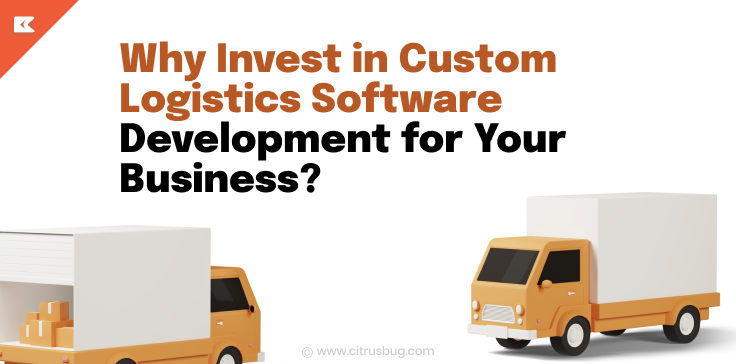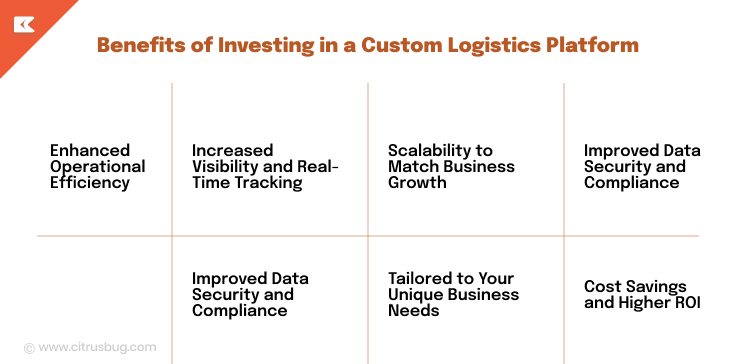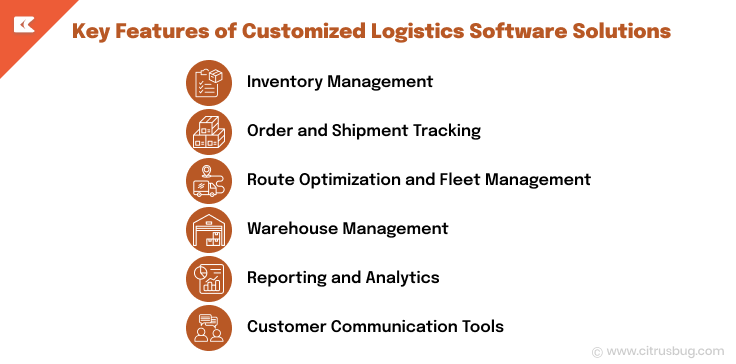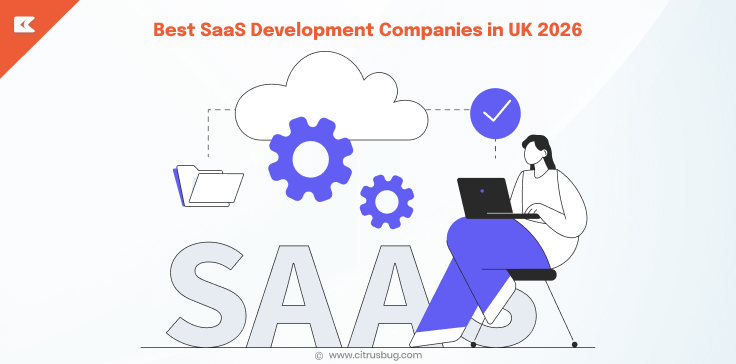Why Invest in Custom Logistics Software Development for Your Business
- November 11, 2024
-
6435 Views
- by Ishan Vyas
Table of Contents
- Understanding Custom Logistics Software
- Benefits of Investing in a Custom Logistics Platform
- Key Features of Customized Logistics Software Solutions
- Real-World Success: Companies Benefiting from Tailored Logistics Software
- Is Customized Logistics Software Right for Your Business?
- Conclusion: Choosing the Right Partner for Custom Logistics Software Development

In today’s fast-paced digital age, logistics companies face unprecedented demands. Consumers require quick, prompt, and hassle-free deliveries, and logistics organizations must align their operations and control their expenses while keeping ahead of competition. While off-the-shelf solutions may be able to help with basic needs, they often require flexibility and customization that uniques business requirements demand. This is where customized solutions in logistics software come into the scene, offering tailored functionalities tailored to your company’s very processes, goals, and challenges.
Understanding Custom Logistics Software
Custom logistics software development means developing and designing solutions specifically for logistics operation. That means the software is tailor-made rather than generic software that happens to be pre-built and involves standard features. The advantages of custom-built software is that it can simply use it to optimize fleet operations, streamline inventory management, enhance real-time tracking, and continue to improve customer service.
Benefits of Investing in a Custom Logistics Platform
Enhanced Operational Efficiency
Customized logistics solutions enhance day-to-day procedures while streamlining and automating more jobs. As customized software helps in automatic, recurrent, and redundant tasks; with the reduction in the manual data entry which lessen the errors within an operation. Additionally, logistics managers can make quick decisions that would respond faster to changed supply and demand through integration with real-time data. According to the McKinsey report on automation, logistics can cut operational costs by up to 30%. This already demonstrates potential cost savings with custom software.
Increased Visibility and Real-Time Tracking
Real-time visibility is a requirement in managing supply chains quite effectively in logistics. This type of software can be adapted to suit support for IoT devices, GPS systems and mobile apps, giving end-to-end visibility into goods movement. It raises transparency as the ability for the companies to track shipment status, predict delays, and communicate appropriate delivery times to customers. As per Statista, about 70% of logistic professionals viewed real-time tracking as essential for customer satisfaction.
Scalability to Match Business Growth
One major drawback to off-the-shelf software is that it cannot scale very well with the growth of your business. Logistics custom development allows for growth as you expand by adding new features, users, and functionalities. Whether it be an expansion into new markets, increase in fleet size, or growing more suppliers in the supplier network, such software can increase with your business to afford cost-effective migrations or replacements in the future.
Improved Data Security and Compliance
Indeed, the cyber threat mounted over the last few years has made data security paramount in logistics. Thus, custom logistics solutions may include cutting-edge security requirements and meet industry-specific compliance standards to ensure secured information. For instance, many companies engaged in logistics deal with sensitive customer information, payment data, and confidential trade secrets that require robust security protocol. This is possible by having custom solutions that allow an implementation of specific security measures that your business needs, thereby reducing risks from data breaches and ensuring compliance with regulations like GDPR and CCPA.
Seamless Integration with Existing Systems
Logistics companies often use a number of systems for inventory management, order processing, accounting, and customer service. Custom logistics software can be designed to integrate with these existing systems, therefore creating a single unified platform that enhances communication and collaboration across departments. The integration reduces the point of multiple applications, avoids data silos, and provides a single source of truth for all logistics data.
Tailored to Your Unique Business Needs
Each logistics company has its flow, problem areas, and expectations from clients. Building a customised software solution for your logistics requirement provides you with a system built according to your requirements and your needs, avoiding the need to change operations to fit a generic system. It helps in only buying value-added features, making the software less expensive in the long term. For example, if specific specialized tools are necessary for cross-border shipments or logistics that need to be done within a particular temperature, custom software can provide exactly what is needed while removing all the unnecessary stuff.
Cost Savings and Higher ROI
The upfront cost for a custom logistics solution may be more. However, the long-term saving potential along with a high ROI can be immense. Routine work, errors, and downtime are slashed in a custom solution, which are huge cost factors added up very quickly. Revenue growth is fueled by improved operational efficiency and customer satisfaction. Indeed, results from a research conducted by Capgemini attest to this, as well as the fact that investment in tailored logistics solutions increased the average efficiency of businesses by 25%.
Key Features of Customized Logistics Software Solutions
In building a custom logistics platform, it is very important to consider features that speak to your unique business needs. Some critical aspects include;
Inventory Management
It is fundamentally equipped with robust inventory management, thereby giving companies scope to monitor the level of stocks, manage stock across locations, and avoid stockouts. Its integration with real-time data optimizes the control of inventory and reduces holding costs through one of the best custom logistics software.
Order and Shipment Tracking
Real-time tracking orders allow for the convenience of all shipment tracking to customers as much as to businesses. Status updates, the time it may take, and any sort of disruptions within the delivery process that could trigger the notice can all be given through custom software solutions for detailed tracking functionalities.
Route Optimization and Fleet Management
In logistics, effective management of the fleet is important in delivering to the customer without delaying in time and doing this at the lowest costs. With route optimization software, calculations for optimal routes using AI and machine learning capabilities make sense; thus saving much fuel and eliminating some driving hours for them. This is particularly crucial for businesses offering same-day freight deliveries, where efficiency and timing directly impact customer satisfaction.
Warehouse Management
Custom software for logistics may allow warehousing businesses to automate dispatch through dispatch management software. This facilitates automation in picking, packing, and shipping processes and can better utilize space with increased order fulfillment accuracy.
Reporting and Analytics
Typically, the custom logistics software has powerful reporting and analytics features that help the companies gain insightful understanding of their operations. Therefore, businesses are able to discover bottlenecks as well as monitor KPIs by analyzing data from across the supply chain and use that data for data-driven decisions for improving productivity.
Customer Communication Tools
As a rule, today’s customers like to know about the whereabouts of their orders and want updates regularly. Thus, with the help of the customized logistics software, you can give your customers real-time notifications and enhance customer satisfaction by keeping clients informed every step of the way.
Real-World Success: Companies Benefiting from Tailored Logistics Software
Many companies significantly enhanced their operations by investing in custom logistics software. For examples:
- Amazon has designed its custom-made logistics software that provides real-time tracking, predictive analytics, and optimized delivery routes in ensuring fast and reliable delivery
- FedEx uses customized logistics solutions for route optimization, tracking packages, and data analytics toward managing millions of deliveries per day at minimal costs.
The examples show the difference custom logistics software can make in how business operations, customer services, and profitability are conducted.
Is Customized Logistics Software Right for Your Business?
While the advantages of a custom logistics software solution are numerous, it is also important to weigh whether this investment aligns with your business objectives, budget, or operational need. Custom software is best suited to those business organizations looking to scale and improve the efficiency of their processes as well as to gain a competitive advantage, whereas if logistics requirements are pretty straightforward, then an off-the-shelf solution would be enough.
To determine the best course of action, consider these factors:
Business Size & Complexity
Custom solutions are suitable for large, or growing businesses with complex logistics needs, as their functionalities are unique and cannot be covered by generic software.
Budget Consideration
The development of a logistics software solution is a long-term investment. While the initial costs may seem higher than ready-made solutions, the long-term savings and greater efficiency in competitiveness usually make up for the initial cost.
Competitive Advantage
In an extremely competitive logistics business, a custom software solution can offer the much-needed advantage that you can provide services unique to no one else.
Conclusion: Choosing the Right Partner for Custom Logistics Software Development
An investment in a customized logistics software solution would better your business with the level of tailor-made tools tailored for efficiency, scalability, and customer satisfaction. Companies making investment based on technology and innovation will have the best shot in the future since logistics is constantly changing. To businesses ready to take this next step, it is important to collaborate with an experienced provider in custom software development services. A development partner that has deep expertise in logistics and a proven track record of successful projects, but also someone who is able to understand and execute your unique vision, would be your best choice.
By implementing a custom logistics solution, you can improve processes, reduce costs, and build a more resilient and competitive business prepared to meet the demands of the modern logistics industry.





 SaaS Development
SaaS Development Web Application Development
Web Application Development Mobile Application Development
Mobile Application Development Custom Software Development
Custom Software Development Cloud Development
Cloud Development DevOps Development
DevOps Development MVP Development
MVP Development Digital Product Development
Digital Product Development Hire Chatbot Developers
Hire Chatbot Developers Hire Python Developers
Hire Python Developers Hire Django Developers
Hire Django Developers Hire ReactJS Developers
Hire ReactJS Developers Hire AngularJS Developers
Hire AngularJS Developers Hire VueJS Developers
Hire VueJS Developers Hire Full Stack Developers
Hire Full Stack Developers Hire Back End Developers
Hire Back End Developers Hire Front End Developers
Hire Front End Developers AI Healthcare Software Development & Consulting
AI Healthcare Software Development & Consulting Healthcare App Development
Healthcare App Development EHR Software Development
EHR Software Development Healthcare AI Chatbot Development
Healthcare AI Chatbot Development Telemedicine App Development Company
Telemedicine App Development Company Medical Billing Software Development
Medical Billing Software Development Fitness App Development
Fitness App Development RPM Software Development
RPM Software Development Medicine Delivery App Development
Medicine Delivery App Development Medical Device Software Development
Medical Device Software Development Patient Engagement Software Solutions
Patient Engagement Software Solutions Mental Health App Development
Mental Health App Development Healthcare IT Consulting
Healthcare IT Consulting Healthcare CRM Software Development
Healthcare CRM Software Development Healthcare IT Managed Services
Healthcare IT Managed Services Healthcare Software Testing services
Healthcare Software Testing services Medical Practice Management Software
Medical Practice Management Software Outsourcing Healthcare IT Services
Outsourcing Healthcare IT Services IoT Solutions for Healthcare
IoT Solutions for Healthcare Medical Image Analysis Software Development Services
Medical Image Analysis Software Development Services Lending Software Development Services
Lending Software Development Services Payment Gateway Software Development
Payment Gateway Software Development Accounting Software Development
Accounting Software Development AI-Driven Banking App Development
AI-Driven Banking App Development Insurance Software Development
Insurance Software Development Finance Software Development
Finance Software Development Loan Management Software Development
Loan Management Software Development Decentralized Finance Development Services
Decentralized Finance Development Services eWallet App Development
eWallet App Development Payment App Development
Payment App Development Money Transfer App Development
Money Transfer App Development Mortgage Software Development
Mortgage Software Development Insurance Fraud Detection Software Development
Insurance Fraud Detection Software Development Wealth Management Software Development
Wealth Management Software Development Cryptocurrency Exchange Platform Development
Cryptocurrency Exchange Platform Development Neobank App Development
Neobank App Development Stock Trading App Development
Stock Trading App Development AML software Development
AML software Development Web3 Wallet Development
Web3 Wallet Development Robo-Advisor App Development
Robo-Advisor App Development Supply Chain Management Software Development
Supply Chain Management Software Development Fleet Management Software Development
Fleet Management Software Development Warehouse Management Software Development
Warehouse Management Software Development LMS Development
LMS Development Education App Development
Education App Development Inventory Management Software Development
Inventory Management Software Development Property Management Software Development
Property Management Software Development Real Estate CRM Software Development
Real Estate CRM Software Development Real Estate Document Management Software
Real Estate Document Management Software Construction App Development
Construction App Development Construction ERP Software Development
Construction ERP Software Development








